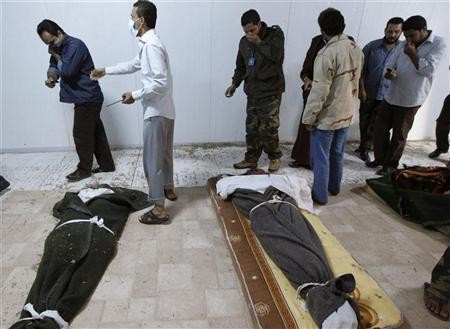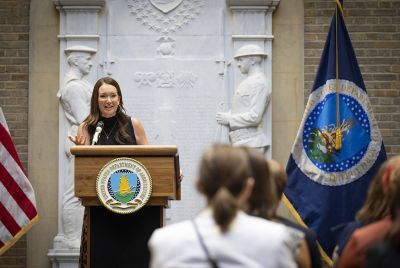Gaddafi Killed with Bullet to the Head, Autopsy Confirms

Muammar Gaddafi's autopsy confirmed the former Libyan leader died from a gunshot to the head, the country's chief pathologist said, a move which is set to amplify allegations the deposed head of state has been executed by one of his captors.
The confirmation of Gaddafi's fatal shot in the head coincided with the NTC leaders' announcement the country has been liberated.
However with controversy still surrounding the colonel's death, observers are questioning the country's planned transition to democracy and the ability of its leaders to control their own forces.
Since the death of Gaddafi, the transitional regime has been plagued by rumours of rifts and indecisions regarding how to handle and dispose of the leader's body, which was put on public display in a commercial in the port city of Misrata, for four days.
The leader has now been buried in a secret location in the desert, with Muslim clerics reportedly present, but his death is still causing a stir.
While the 69-year-old was captured wounded, he was still alive. However graphic footages of Gaddafi being beaten up and kicked around by rebel fighters raised alarm bells.
A young Libyan has also since then claimed he shot Gaddafi in the head after his capture.
The comments contradicted earlier reports from the NTC leaders who had said the Col was fatally wounded in cross fire while heading to a hospital in an ambulance.
The driver of the ambulance however later on told reporters the leader was already dead when put in his vehicle.
Chief pathologist Dr Othman al-Zintani has now confirmed that Gaddafi was killed by a shot to the head, but refused to provide further information.
Despite maintaining their will to lead the country toward a more democratic and transparent state, the leaders of the NTC's failure to condemn atrocities conducted by their fighters during the nine months conflict has led rights groups organisations and advocates to fear promises not to tolerate abuse would not be implemented.
The chaotic condition leading to the death of Gaddafi but also his son Mutassim and Libya's former national security adviser have also demonstrated a clear lack of control by the leadership and a gap between the discourses held on the diplomatic scene and the acts on the ground.
For years the Gaddafi regime managed to reign via fear, covering up acts of torture and assassinations, so it is important for the new leaders to push for more transparency and openness.
Western countries have widely supported the NTC throughout the war, pushing for a UN resolution that established a NATO operation in Libya which had for aim to protect civilians, but rights organisations have warned illegal killings have been committed by both camps.
Some of the anti-Gaddafi fighters have been accused of arbitrary arrests and torture, and killings but few indications point to the potential prosecution of those responsible.
In August, Gen. Abdul Fattah Younes, a top military commander for the NTC forces , was killed in Benghazi along with two of his aides but despite leaders saying an investigation would be launched, no further information has since then been provided on the outcome of the inquest.
The leadership was also criticised for blaming the killings of Younes and his aides on Gaddafi loyalists while reports that emerged later on suggested rebels were indeed responsible.
Now the comments of NTC leader Abdel-Jalil following the death of Gaddafi have also been under growing scrutiny, with observers saying he once again seemed to blame Gaddafi loyalists.
"Let us question who has the interest in the fact that Qaddafi will not be tried," he said. "Libyans want to try him for what he did to them, with executions, imprisonment and corruption. Free Libyans wanted to keep Qaddafi in prison and humiliate him as long as possible. Those who wanted him killed were those who were loyal to him or had played a role under him. His death was in their benefit," Abdel-Jalil told reporters Monday.
The disturbing death of Gaddafi however did not hamper celebrations in Libya, and few seemed perturbed by the death of their former leader.
However while scenes of celebrations might last a few days, the conflict has cost both sides a many lives and the level of brutality reached during the conflict, with mass graves and tens of bodies found in different locations throughout the country will be difficult to overcome, once trepidation falls.
While Gaddafi's death has ended the conflict, reporters in Libya have pointed out that rebels were still seen looting in Sirte Monday, proving it will be difficult for those in power to harness the fighters who led Libya to its liberation.
© Copyright IBTimes 2025. All rights reserved.




















